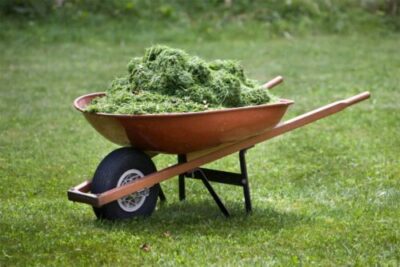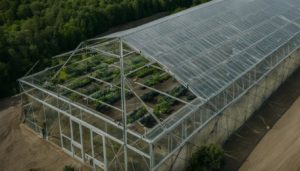Having a lawn means that in the summer months you will have a lot of grass clipping. Grass clipping can be used to ad nutrients back into your lawn but I’m often asked: ‘How long does it take for grass clipping to decompose‘. In this article we break it down.
Disclosure: This article may contain affiliate links – that means we may receive a commission if you make a purchase after clicking on these links. This is at no extra cost to you.
When it comes around to summer time, it can often seem like the grass is growing inches before your very eyes, and maintenance can get more and more time-consuming as time passes by.
However, something that you might be interested to know is that grass decomposes really quickly.
Lawn clippings can break down faster than almost any other debris that you would find in the great outdoors of your garden, and this makes them perfect for use as a fertilizer, compost, or mulch.
So, if your lawn needs to be mowed, you can actually keep your clippings and put them to better use.
If you use your grass clippings right, they can actually help to save you time and money, all while working to create a healthier lawn.
As well as all the benefits, you can also take comfort in the fact that it is really easy to do. To find out more about how to put your grass clippings to use, just keep reading.
How Long Does it Take for Grass Clippings to Decompose?
Due to the fact that grass is 80% water, it will only take a few weeks for your grass clippings to decompose and start to enrich your soil with valuable nutrients.
In order to produce grass clippings that decompose readily, you should allow your grass to grow higher than usual, and never cut off more than the top one-third. So, you will be cutting the grass more often, but cutting off less.
What Should I Do With My Grass Clippings?
You can then use your leftover grass clippings for composting purposes. The process is as simple as leaving the clippings on the lawn once you have finished mowing. This will keep your lawn healthy.
Reusing your grass clippings will mean that you will have to fertilize less. When these clippings decompose, the lawn will soak up all of the nutrients, like nitrogen, phosphorus and potassium.
Due to this extra boost, you won’t have to fertilize your grass as often. Recycling clippings also indirectly improves the soil structure, allowing it to hold up to 12% more water.
It also means that you will spend less time mowing your lawn. You can save up to 35 minutes every time you mow your lawn, which means that over the entire season, you will have spent 7 hours less doing lawn maintenance.
As well as all of this, you can help to reduce waste. Grass trimmings make up almost 20% of our solid waste, so you can go ahead and recycle your trimmings instead of putting them in the trash.
How to Compost Grass Clippings
To compost your grass clipping directly into your yard, you will first need to mow the grass with a sharp blade. Be sure to never remove more than the top one-third of the grass height at one time.
Once you have mowed your grass to the ideal height, 3 inches for cool-season and 2 inches for warm-season grasses, you can move on to the next step.
During peak season, you should make sure to mow your lawn every 5 days, instead of every 7 days. Even though this sounds like more, the work will take you less time, so it really isn’t.
Now, all that is left to do is to leave the grass clippings in the yard, and your work is done. If the clippings start to build up into piles, you should rake them out, so they can decompose quicker.
Reasons Why You Should Leave Grass Clippings On Your Lawn
One of the main reasons why you should leave your grass clippings on your lawn is so you can return nitrogen to your soil. Grass clippings are a great source of nitrogen, and as the grass breaks down, your fresh grass can absorb the benefits. More nitrogen means healthier grass. this is called mulching.
As well as this, you are adding organic matter to the soil, which can have a variety of benefits. One of these benefits is increasing the absorption of moisture in order to keep your lawn watered for longer.
Another is that it can help to aerate your soil, and it can even feed insects that are beneficial to the process. Insects and worms will break down the organic matter into nutrients that the grass can absorb.
Leaving grass clippings on your lawn can also provide shade for the soil and weed-preventing mulch as the grass clippings decompose.
Your grass will still get lots of sun, but the shaded soil will stay moist for longer. It will also prevent weeds from growing, as they need sunlight to germinate.
What Else Can You Do With Your Grass Clippings?
Alternatively, you can:
- Add them to your compost pile to add nitrogen
- Put them in your municipal compost bin
- Use grass clippings as mulch to prevent weeds and keep the soil moist
- Feed either fresh or dry grass to livestock
- Add as bedding to vermicompost bins
- Give grass clippings away to community gardens


